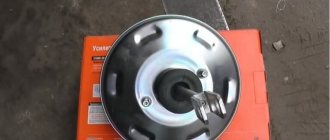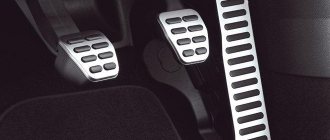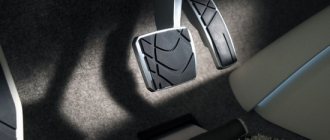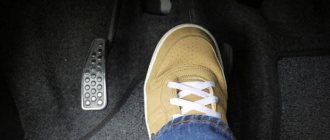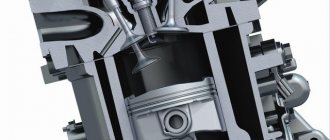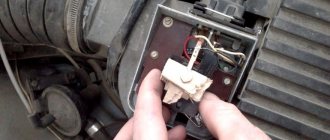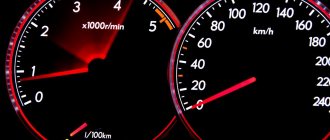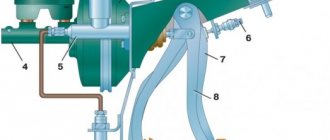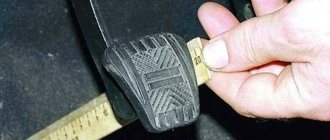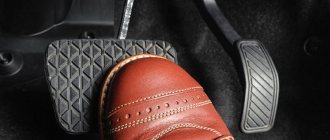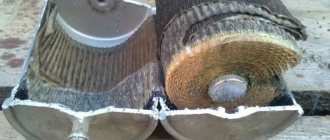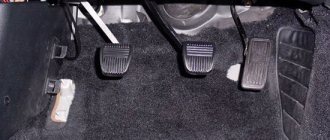Brake systems
This is one of the key safety factors. It is with the help of brakes that the driver can reduce the speed of the car until it comes to a complete stop. There are several types of systems. The most common option is with a hydraulic drive. Here, the force from pressing the pedal is transmitted using brake fluid to the actuators. They are on the hubs. As for the brake mechanisms themselves, two types of solutions are used in cars. These are the popular disc brakes today and the older version - drum brakes. In the first mechanisms, the pads interact with a disc mounted on the hub. As for the second, they are located inside the brake drum. The deceleration process is carried out due to the fact that the pads are unclenched and pressed against the internal planes of the drum.
Drum brakes are a rather old and archaic solution. But they are still widely used on budget cars. A parking brake is also implemented using drum brakes. Thus, there are disk systems in front, and drum systems in the back.
About service
Like any other system in a car, brakes require regular maintenance. In the case of a hydraulic mechanism, it is necessary to periodically replace the pads - they tend to wear out. It is important to monitor the condition of both discs and pads from time to time. Drum brakes also need to be checked regularly. As for the drive itself, they check the condition of the lines, visually diagnose the system for fluid leaks, and monitor its level in the tank.
Also, after any maintenance work on the car's brake system, it is necessary to bleed it. This is done in order to remove air from the lines. The presence of air in the pipeline can reduce the effectiveness of the brakes, or even affect their performance. Since the system does not have a large number of different components, many consider it to be unusually reliable and think that with proper care it will not cause any serious problems to the owner. However, this is not always the case. Problems can arise in structures of any complexity. One of the most common problems with brakes is characteristic sounds when braking. A knocking noise occurs when you press the pedal.
Why is it stupid? Basic faults
Type of VAZ-2112 engine
There are not many reasons for the effect when the 16-valve engine on the VAZ-2112 16 valves stalls. Of course, you will have to tinker a little in order to find the true reason in one case or another, but otherwise there is a direct road to a car service center. For those who have decided to repair their car themselves, this information will be useful.
So, let's look at the main reasons for this effect:
- The problem is in the fuel system.
- The crankshaft sensor has failed.
We clean the sensor from dirt and dismantle it.
- Poor quality fuel.
- The problem is the throttle.
- Ignition fails.
- ECU errors.
The main reasons are considered, and you can move on to solving these problems.
Methods for solving the problem
To eliminate failure during overclocking, you need to check all the components listed below step by step. This is a considerable amount of work, but the car enthusiast will be able to save a sufficient amount of money, which would have been charged to him at a car service center. Of course, for those who don’t understand the design of a car, that’s the way to go, or ask your friends who will fix the problems for half the price. But, if you follow the instructions, you can figure it out yourself.
Poor quality fuel
Poor quality fuel is a common cause of engine breakdowns
Of course, in our country, low-quality fuel causes many misfortunes and troubles for motorists. It is not possible to check the fuel at a gas station, so everyone is already struggling with the consequences. The only thing that can be done is to carry out regular diagnostics and cleaning of the fuel system.
Fuel system
Injectors on the fuel rail removed from the engine
The first line of engine protection is fuel filters, which sometimes fail and not enough fuel gets into the engine. On the other hand, when completely clogged, the injectors are clogged, which at low speeds give a normal amount of mixture, but if the engine is accelerated, the amount of mixture remains the same and a failure appears at low speeds.
The way out of the situation is to replace the fuel filter, clean or replace the gasoline pump mesh, and diagnose and replace failed injectors. The latter usually go through a cleaning stage, but this does not always help and they have to be replaced.
Throttle valve
Cleaned throttle body
A stuck throttle valve and insufficient air supply can cause the engine to become sluggish when accelerating. This is due to a non-optimal fuel mixture. In this case, the solution to the problem is cleaning.
Ignition system
High voltage wires of the ignition system
Another reason that the car began to stall while accelerating could be interruptions in the ignition. So, it is necessary to check the spark plugs and high-voltage wires where breakdowns could occur. If necessary, damaged parts must be replaced. The manufacturer recommends replacing everything in sets.
ECU errors
List of electronic control unit errors
The last problem is that errors occur in the electronic engine control unit. If there is a large accumulation of errors, this can affect the operation of various vehicle systems. Therefore, as practice shows, resetting ECU errors leads to normalization of the operation of the power unit.
There are a great many reasons for the strange behavior of a car during acceleration, all of them are different in their nature of manifestation and complexity of elimination. They have one thing in common: they are all associated with malfunctions in very important parts and components of your machine, so you should find out the cause of this problem as quickly as possible and eliminate it.
Peculiarities
These sounds can have a very different character. They can be heard from different sides of the car, and also occur in a certain position of the pedal. The knock can be either single or repeated. Most often, a knocking noise is heard from the front when braking after any maintenance work has been done on the brake system. It is very difficult to diagnose problems in brake mechanisms by knocking. Even if something vibrates, it is not at all necessary that it will be the brake system. Sounds can come from leaking struts and failed rear shock absorbers, anti-roll bar fasteners and many other components.
The mount has come loose
This happens, but quite rarely. A common reason is traveling on poor quality roads. Vibration can cause bolts to become loose and unscrewed. Usually, this happens soon after a repair affecting the caliper. In this case, you or the master simply did not tighten the bolts. For prevention, always pull fasteners with a certain torque when assembling.
This will save you from problems. To eliminate this knocking noise, simply tighten the bolts. If one of them is lost, make sure it is not broken off and screw on a new one. The broken bolt will have to be drilled out.
Conclusion
. There are quite a large number of different mechanisms near the wheels. They periodically fail. Therefore, the question of what to do if the calipers are knocking is not uncommon. In many cases, this is a design feature that will be quite problematic to eliminate. But it is still quite possible.
About the difficulties of diagnosis
In addition to the braking system, it is worth checking for faults in the wheel drives - this is indicated by a knock in the front suspension when braking. This is a fairly common phenomenon that motorists encounter. Experts say that often the culprits of suspicious sounds can even be the steering system and engine mounts. This is why fault diagnosis is a very complex process. One of the typical features of the occurrence of sounds when braking is that knocking appears only in the pedal, which is depressed halfway. If you press it to the floor during intense braking, then the extraneous sounds will disappear. Car owners often write on forums that this sound can be heard when driving at low speeds, and also at medium speeds. At high levels - less often. In most cases, it is impossible to hear anything as long as the brake mechanism is cold.
Another point that complicates diagnosis is the frequency with which knocking occurs when braking in the front or rear wheel. It can be heard for some time, then disappear completely and appear again after a while. Nowadays, many cars are equipped with ABS - sometimes the malfunction may lie in it. But this is far from a fact. Even self-diagnosis systems are not able to detect errors in the operation of the anti-lock braking system.
Causes
Knocking in the power unit occurs due to the following factors:
- Manufacturing defects;
- Use in the repair of worn parts;
- Use of engine oil that does not comply with the manufacturer’s instructions;
- Frequent use of low quality fuel;
- Errors when operating a car (carrying heavy loads, driving too harshly, etc.).
An incomprehensible knocking sound in the engine is also caused by detonation. This phenomenon occurs when the fuel-air mixture burns too quickly and, as a result, the elements of the internal combustion engine are destroyed.
The causes of detonation are:
- Poor fuel quality;
- Too much compression of the fuel assembly, which is caused by a large layer of carbon deposits located at the bottom of the pistons and on the walls of the chamber;
- Incorrectly set fuel assembly ignition timing;
- Failure of combustion plugs;
- Exhaust system defects;
- Excessive load on the engine that occurs during a rapid increase in speed.
Detonation is characterized primarily by a metallic knock.
Other reasons why the engine knocks:
- The gasoline pump drive knocks, the sound is ringing and loud;
- On diesel engines, the high-pressure fuel pump often rattles, the knocking is loud, it sounds at half the engine speed;
- Sometimes a loud knocking sound occurs due to a weakening of the crankshaft pulley, accompanied by oil leakage;
- A dull sound that appears immediately after repair indicates that the gasket for the cylinder block was selected incorrectly and it is touching the piston. The sound is very quiet;
- Hydraulic compensators knock (at twice the speed) due to a breakdown of the lubrication system, the use of low-quality oil or channels clogged with dirt. Such knocks are heard only at low temperatures; at high speeds they disappear.
In general, the cause of knocking and noise in the engine can be absolutely varied - due to gaps, worn parts, untuned components. So identifying the problem is always difficult.
Caliper piston jamming
During braking, the fluid presses on the piston. However, it gets stuck in the cylinder and remains in this position until an increase in pressure pushes the piston out of it. When this happens, it hits the pads with force and presses them down - this is the reason why you hear a knocking noise from the front when braking.
To correct this situation and get rid of annoying sounds, just remove the caliper and remove the piston. Then its condition is visually checked, and the surface of the cylinder is inspected together with the piston. If traces of corrosion are found during the inspection, the cylinder must be cleaned, and it is recommended to replace the piston.
Brake disk
Often a knocking sound in the front wheel when braking occurs due to crooked discs. This occurs when overheating occurs. During the braking process, the pads, passing through the place where there is a bend, hit it, which causes a knock.
This problem can be treated, but it is quite difficult to accurately identify deviations from the norm without special equipment. If there are severe defects, of course, everything is visible visually, but then it is better to replace the disk with a new one. You can also grind the surface of the disk on a lathe or using special tools. It is better to replace the pads, otherwise after the disk is restored they will wear out on it again. Sometimes you can guess the curvature of a disc by the condition of the pads. They will wear unevenly.
Problems with pads
To identify the reason why the brakes rattle, you should check the pads. A visual inspection may reveal that:
- counterfeit products;
- consumables are completely worn out;
- unsuitable pads are installed, for example, from another vehicle.
The most common noise in the caliper is fake. The main causes of knocking are shown in the table below.
Table - Origin of knocking noise from counterfeit pads
| Reason for knocking | Note |
| Delamination of friction material and support lining | Occurs when the manufacturer uses an adhesive mixture with poor adhesion. |
| Friction lining melting | Friction material particles stick to the disc, causing vibration and knocking as it rotates. |
| Baseplate geometry mismatch | There is a loose fit and uneven distribution of braking forces |
| Incorrect pad dimensions | There is a possibility of play in the seat |
Fake pads after 2500 km If problems arise with the pads, they need to be replaced.
In some cases, it is possible to modify the consumable, for example, if the geometry or dimensions differ from the required ones. In this case, car owners are advised to remove excess parts of the friction material using a file. This should only be done as a last resort, since tampering with the braking system reduces road safety and violates the law.
Knocks in drum systems
In such mechanisms there are a sufficient number of places where knocking from the rear can occur when braking. Often this mechanism is a parking brake. Since the parking brake cable splits into two parts under the car, it may well be that one of the parts has become loose. The mechanism is weak, and when the driver presses the main brake pedal, the pads of the drum system separate. There is play between the pads and the parking brake thrust bar, which is the cause of the knocking noise.
Silent blocks and bushings
These parts with a lot of wear can cause a characteristic sound. If the silent block in the steering mechanism is worn out, then it will knock. Finally, it is recommended to check the engine mounts and engine mounts. Just a little relaxation is enough for everything to go smoothly in the cabin.
If you can clearly hear a knock when starting and braking, then the first step is to diagnose the CV joints. Pay attention to the sounds when turning the wheels for the first time. If you hear knocking noises, then the problem is in the car's chassis. Also among the reasons are a broken constant velocity joint, a failed steering rod, and a worn rack. By the way, the latter can leak if there is a malfunction - you should pay attention to the anthers. They may have malfunctioned. Vibrations may also indicate that ball joints and shock absorber struts need to be replaced soon.
Wheel bearings
We continue to study why the rear right wheel knocks when driving. Whether it’s the 9th Lancer or a VAZ, it doesn’t matter – the bearings make the same noise when they wear out. But the sound is very insidious. At first it will be barely noticeable. If it is not detected in time, the broken holder may simply jam the wheel at speed. Also, knocking noise occurs if the bearing is not tightened properly. To diagnose this, just lift the rear wheel on a jack and shake it from side to side.
Note! The bearing should not be over-tightened. You need to leave a small gap in case of thermal expansion
Minor play is allowed. But if the wheel wobbles, this already indicates a problem.
Summary
The braking system is the basis for vehicle safety. If the slightest problem occurs in its operation, you must immediately look for the problem and fix the problem. In fact, there are not so many reasons. In addition, everything can be much simpler - for example, a knock in the wheel when braking occurs due to a loose caliper mounting bolt.
The appearance of a knocking sound when you press the brake pedal is not common, but it still occurs. At the same time, diagnosing the cause of the knock is quite difficult.
Let's figure out where this knocking comes from and how to solve this problem.
The braking system is one of the main ones ensuring traffic safety. This is what slows the car down to a stop.
The most widely used system on cars is a hydraulic drive system, when the driver’s force is transmitted through the working fluid to the brake mechanisms installed on the wheel hubs.
As for the mechanisms themselves, there are two types of them used on cars - now disc mechanisms in which pads, the elements that perform deceleration, interact with a disc mounted on the wheel hub are becoming increasingly widespread.
Previously, drum mechanisms in which the shoes were placed inside the drum were more common in use; the deceleration in such mechanisms was carried out by decompressing the shoes, as a result of which they were pressed against the inner surface of the drum.
But they did not completely abandon the use of drum mechanisms, since they have a well-implemented parking brake system.
Therefore, many cars are equipped with disc mechanisms at the front and drum mechanisms at the rear.
Maintenance of a hydraulically driven system comes down to periodic replacement of the pads, since they are worn out as a result of interaction.
Therefore, checking the condition of discs and drums is necessary.
The condition of the pipelines in the drive is checked, a visual inspection is performed for leaks, and the liquid level is monitored.
Often, after repair work, it is necessary to bleed the brake drive to remove air from the pipelines, because its presence can affect the performance of the system.
Since the brake system does not include a large number of elements, it is considered to be quite reliable and should not cause problems with proper care and maintenance.
But it is not always the case. Even in such a seemingly simple system, problems can arise.
One of the most common problems is the appearance of a knocking sound when pressing the pedal.
Guides
The caliper is constantly subject to quite heavy loads. Therefore, problems with them are not uncommon. And on some Chevrolet models, this is a generic disease that appears after 20,000-30,000 kilometers. There are several ways to fix this problem:
- Replacing guides. This method does not always help. We buy a set of new guides and install it. If everything is in order, then the problem will disappear. But, she will return after some mileage. When the knocking occurs again depends on the characteristics of your vehicle. In some cases, the knocking noise is caused by wear on the guide seats. Dealing with such a malfunction is much more difficult. In this case, special rubber bands are installed on the pins. To do this, you will have to purchase special reinforced guides. But this pleasure is not cheap. Each set contains only 1 elastic band. Accordingly, one wheel will require from 2 to 4 sets. But, you will forget about the knock for quite a long time;
- There is a special lubricant for calipers. In general, this is a preventive measure. But, in some cases it helps to get rid of knocking. To use, pull the guide out of its seat and lubricate it thickly with lubricant. After that, we place part of the lubricant in the socket. We insert the pin into place and secure it. Depending on the degree of wear and the quality of the lubricant itself, one treatment should be enough for 500-10,000 kilometers. This lubricant is usually sold in small bags per guide;
- There is also a rather radical way to solve the problem. This is the addition of a spacer spring. To do this, you will have to drill holes in the caliper and brake cylinder block. After which, the parts are tightened using a spring. Suitable from VAZ drum brake repair kit.
Features of knocking noises when braking
This knocking sound can have a different character - it can come from different sides of the car, appear at a certain length of pedal depression, be repetitive or single.
Often, knocking appears after maintenance work has been carried out on the system mechanisms.
One of the features that makes it difficult to detect this knocking noise is that it is not necessarily the brake system that produces them.
The cause may also be the wheel drive, suspension, steering mechanism, or power plant suspension. Therefore, identifying the cause of knocking can sometimes be very difficult.
One of the features of this phenomenon is that often knocking occurs only when the pedal is half depressed.
Or the pedal is fully depressed, for example, during heavy braking, then no sounds appear.
It is also often mentioned that the knocking noise is more noticeable when driving at low and medium speeds.
In some cases, it does not appear until the brakes warm up.
That is, when you start moving, you don’t hear anything, but after heating, an unpleasant sound appears.
It can also be periodic, you can hear it for a while, then the knocking disappears, but then appears again.
If the car is equipped with an ABS system, this may be the cause.
Although many cars are now equipped with an ABS self-diagnosis system, it may not always indicate a malfunction. That is, this system does not give any signals, but the ABS is faulty.
Next, we will describe the most common causes of knocking when pressing the brake pedal. First, the elements of the brake system itself in which this malfunction may appear will be indicated.
Naturally, knocking is often caused by faulty brake mechanisms.
Finding the cause may be easier if the knocking noise appears from a specific direction.
Expert answer
I had a similar knocking sound that sounded like "DUK-DUK-DUK". The sound is the same as in the video, only weaker.
If you have exactly this sound, then it is almost 100% that the brake pad is clinging to the drum. It remains to find out why this happens.
Hello fellow clubbers, while driving, when you press the brake from behind, you can hear a knock knock knock knock on the right side, what could be the problem? Can you tell me if anyone has encountered this? Thank you all in advance.
Added after 56 seconds Can the drum work out?
Hello fellow clubbers, while driving, when you press the brake from behind, you can hear a knock knock knock knock on the right side, what could be the problem? Can you tell me if anyone has encountered this? Thank you all in advance.
Added after 56 seconds Can the drum work out?
take the drum off and take a look. maybe the pads are screwed. The spring may have broken. the sooner the better, otherwise there may be a wedge
I also noticed a knocking sound in the brake drums when pressing the brake pedal, BUT with the handbrake pulled out. I seem to have changed the pads recently (last year) and the brake cylinders too
no way, I noticed it yesterday. When you release the handbrake there is no knock. I'll take a look sometime.
No, I have it while driving, when you approach a traffic light and press the brake and this knocking noise occurs.
The brake cylinder is bad, a friend had the same problem
which one, or the main one or whatever the vacuum cleaner is. Tell me what exactly he changed, and what exactly.
I changed both brake cylinders on both sides and changed the brake pads at the same time.
On the new car there was a similar knock-knock-knock when braking on the left rear wheel. We disassembled the drum, everything was fine there, put it back together, adjusted the handbrake, everything stopped.
And I had the same thing on the new one. Car with ABS. There was also a knock-knock-knock noise when braking on the left rear side. I went to the service station. We went for a ride with the master. Then they opened it. They looked, shrugged, and put it back together. The knocking sound disappeared. Now the mileage is 57 thousand. The knocking noise no longer appears.
This happened to me when braking on a 6. The rear wheel made knocking noises (like knock, knock, knock) in time with the rotation of the wheel. An autopsy showed that the wheel bolt, which was too tightened, was touching the side of the brake pad with its end. There was a fresh impact mark on them. It was cured by shortening the bolt on sandpaper by 2mm.
Did you by any chance put a casting bolt in the regular wheels?
I got the same crap. I took it to a service station and they installed the rear camber plates. Well, there’s something with the front end, but that’s not the point. Now, when braking at speeds less than 50, there is a knock-knock-knock from behind. At lower speeds the sound is louder. What the hell? Today I want to look at the service station. Let them dig. But to speed up - where to look??
Write back later how they do it and how.
Then the knocking noise could be either loose pads or something foreign.
1. Does the car have ABS? 2. At what pressure? Those. when braking “to the floor” or during normal full braking? 3. When making such sounds, does the pedal hit your foot or vibrate? In general, how does it feel on your leg?
1 there is no ABS on the car 2 the pedal crunches every time you press it 3 it’s just a nasty crunch
Added after 1 minute in 571oa, I blame the springs. I think when installing the spacers, the service stations could have messed up. Yesterday there was another knock-knock noise when braking. but not with everyone. Surprised. I'll take a look at the weekend. PS No ABS.
and I’m sinning either with the GTZ or with the vacuum cleaner. or even brake cylinders.
For those who have a knock from the rear, which is reflected in the pedal, and the car does not have ABS, then look at the geometry of the brake drums - even a small oval will give such an effect.
